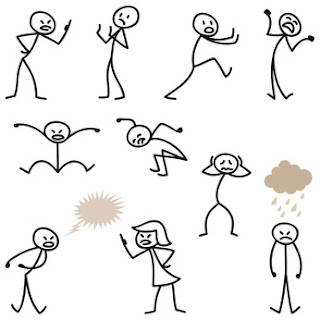When we have emotions, they are accompanied by a range of
mental and physical feelings. As authors, we should try to explore all the
feelings (even the bad ones) in order to inform our writing and ensure it
really reflects reality as closely as possible.
By becoming skilled at translating our own feelings into
words that our characters experience, they feel more genuine and real.
Analysing and naming feelings
The first stage is to try to identify each feeling and
emotion as exactly as possible.
At a most basic level, you could say that each feeling is
good, bad, or neutral. But of course, each of these types can be split into many
different variations of emotion, which don’t all sit on a flat sliding scale.
For example, under good we might have: happiness, joy,
delight, relaxation, contentment, excitement and anticipation.
Under bad, we might have: sadness, anger, frustration,
impatience, depression, discontent, irritation and rage.
Try to label your feelings as accurately as you can as a
first stage of identifying the range of emotions and their tones.
Investigating the feeling tone
Once you have started identifying the vast range of emotions
in your palette, you can start to look at them more closely in order to notice
the tone and physical feelings associated with them. The more you do this the
better you get at it and the more detail you notice, which you can then use to
inform your writing.
Here are some examples:
Anger
Anger is energetic and speedy. It’s hot and explosive and
doesn’t pause for thought. It makes you feel tense
and hot. Your heart and
breath speed up to feed the energy usage. It often comes with a tightness in
the chest.
Next time you’re angry, try to step out of the anger for a
moment and experience it as if you were your own character. How would you
describe the feeling to a reader? Which part of your body can you feel the
strongest? How does it feel?
Delight
Delight is a particular facet of happiness that has an
innocent, childlike quality to it. It is usually caused by outside stimulus and
leaves us feeling light and buoyant. Our faces feel relaxed and ready to smile
and our lungs fill with delicious air. We can feel giddy and lost in the moment
and sometimes we might feel like the barriers between us and the rest of the
world are not as thick and certain as they usually are.
Next time you feel delighted, try to identify the sensations
in your body and mind that make up such a feeling. Notice how your relationship
to the world around you changes.
Emptiness
Emptiness is a dark, grey feeling which is hollow and heavy
at the same time. We lack energy, and everything seems pointless. Our limbs
feel thick and clumsy. Sometimes we may feel unsteady, ungrounded. Our minds
feel fuzzy, our thoughts trying to move through thick liquid. Emptiness often
feels like it will last forever.
Next time you feel emptiness, try to analyse what makes it
‘emptiness’ and also how the feeling evolves. What immediately preceded the
feeling of emptiness – did it come on suddenly or gradually? What happens as
the feeling leaves?
Summary
By getting to know our own emotions and feelings and how the
sensations affect us both physically and mentally, we expand our toolbox and
prose writing depth and range. Bring your characters to life with descriptions
of their feelings that really resonate with the reader, because they have their
basis in real experience.


















0 comments: